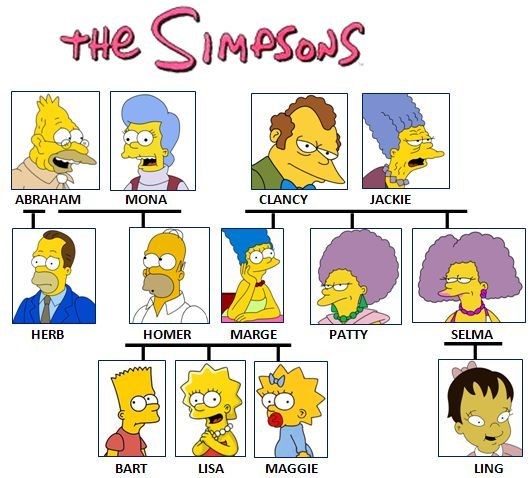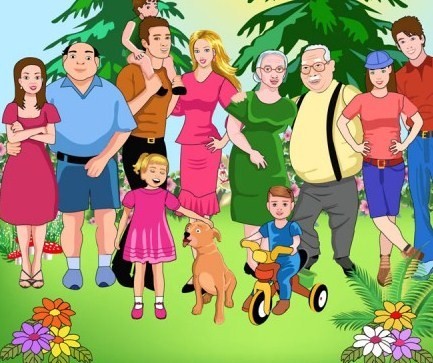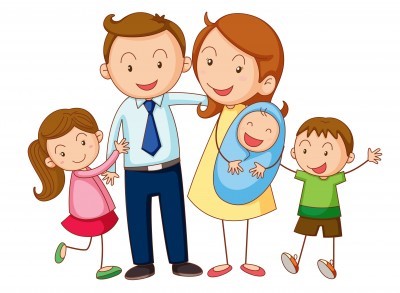Family in English with transcription. Family in English: Useful vocabulary
Do you already know how to say hello and goodbye, tell a little about yourself? Now it's time to study the topic "Family" in English. We will introduce you to new words denoting numerous relatives. And after reading the material to the very end, you can create a sketch of your own family tree in a foreign language.
Family: Young and Old (Family: young and old)
| Father | ["fɑːðə] | Father |
| Mother | ["mʌðə] | Mother |
| Daughter | ["dɔːtə] | Daughter |
| Son | Son | |
| Sister | ["sɪstə] | Sister |
| Brother | ["brʌðə] | Brother |
| grandfather | ["græn(d)ˌfɑːðə] | Grandfather |
| grandmother | ["græn(d)ˌmʌðə] | Grandmother |
NB! In English, there are also affectionate addresses for close relatives. So
- "mother" in English will be Mum, Mom, Mummy, Mamma, Ma (mommy, mommy);
- "Daddy" - Dad, Daddy, Papa, Pa (daddy, daddy);
- "Granny" - Grandma, Granny;
- "grandfather" - Granddad, Granpa.
The next block presents the "cousin" relationship:
Want to get some rest? Sing a short song about the family tree:
At the same time, repeat the words "mom", "dad", "sister", "brother" in English; learn how to spell a "mini-dossier" about a relative.

And now it's time to find out the rest of the names (presented in alphabetical order):
| brother-in-law | Brother-in-law, brother-in-law, son-in-law, brother-in-law |
| Daughter-in-law | Daughter-in-law, daughter-in-law |
| Father-in-law (husband's father) | father-in-law |
| Father-in-law (wife's father) | father-in-law |
| godfather | Godfather) |
| godmother | Godmother) |
| mother-in-law (husband's mother) | mother in law |
| mother-in-law (wife's mother) | mother-in-law |
| second cousin | Second cousin (sister) |
| sister-in-law | Sister-in-law, sister-in-law, daughter-in-law |
| son-in-law | son-in-law |
| stepbrother | Step-brother |
| stepfather | stepfather, adoptive father |
| stepmother | Stepmother, foster mother |
| step sister | half sister |
| third cousin | Fourth cousin (sister) |
Now you know how the words "mother-in-law", "godfather", " step-brother"", "daughter" in English<.>
| (Bride) groom | groom (at the wedding) |
| Boyfriend | guy (friend), boyfriend |
| Bride | bride at the wedding |
| Divorced | diluted |
| Engaged | engaged, betrothed |
| ex-husband | ex-husband |
| ex-wife | ex-wife |
| Fiance | groom |
| Fiancee | bride |
| Girlfriend | girlfriend, bride |
| Husband | husband |
| identical twins | identical twins |
| lover | lover, mistress |
| Married | married, married |
| separated | not divorced but not living in the same family |
| Single | single, unmarried |
| Spouse | spouse) |
| triplets | triplets |
| Twins | twins, twins |
| Widow | widow |
| Widower | widower |
| wife | wife |
Having learned these names, including how to spell “groom”, “girlfriend”, “twins”, “husband” in English, you will be able to write a story not only about parents, but also about own family or future relationship.

Speak about the Simpsons
And finally useful words and expressions that are useful when compiling a thematic story:
Adopted child (son, daughter) - adopted / adopted child (son, daughter)
Ancestors - ancestors
Child (children) - child (children)
Divorce - divorce
engagement
family - family
Foster - adoptive, patronage (about family)
Grandchildren - grandchildren
Grandparents - grandparents
Great-grandchildren - great-grandchildren
Great-grandparents - great-grandmother and great-grandfather
Honeymoon - honeymoon
In-laws - relatives on the part of the husband or wife (in relation to the other spouse)
Marital status - marital status
Marriage - marriage
Parents - parents
Relative - relative
Single-parent family - a family with one parent
The kin / the folks - relatives
The only child only child(in family)
Wedding - wedding
_________________
For ages - for many years
To apply to with one's problems - handle problems
To get on well - get along well
To live together - live together
To love and support - love and support
grammar minute
Having so fully touched on the lexical side of the topic, we would like to draw your attention to some grammatical points:
- Nouns denoting relatives are usually used:
- with the indefinite article if we are talking about relationships in general, for example, I have got a daughter (I have a daughter).
In English, it is better to use to have got in this case.
- with zero article and capital letter“Mother” “Father” is written when we talk about our parents, for example, Father is in the garage now (Father is now in the garage).
- with a proper name after the word or with a possessive pronoun before it, for example, I'm talking to Uncle Jim (I'm talking to Uncle Jim).
- with the indefinite article if we are talking about relationships in general, for example, I have got a daughter (I have a daughter).
- If we are talking about someone's relatives, be sure to use the appropriate possessive pronoun, for example, Her cousin Kate is divorced (Her cousin Kate is divorced).
- If we are talking about members of the same family, it is necessary to put a definite article in front of the surname, for example, the Johnsons (members of the Johnson family).

How can you characterize the Smiths?
Security questions
Now try to answer the questions without looking at the text above:
- How do you pronounce "daughter", "grandmother", "father", "cousin", "sister" in English?
- How do you spell "mother", "father-in-law", "nephew", "brother-in-law", "great-grandchildren", "twins", "adopted son" in English?
- Name words related to marital status.
- How do you spell grandma, grandpa, dad in English?
- Make a list of your ancestors with indication of relationship.
If you answered all the questions correctly, congratulations!
About My Family
And finally, a short thematic story.
My family is not very big. I have got a husband and two children. We try to do our best to get on well and that is why we are very friendly. We got married 5 years ago and since that time we have quarreled only once or twice. Our daughter and son like to visit their grandparents from both sides. And we hope that our family will become larger soon.
My family is not very big. I have a husband and two children. We try to do our best to get along with each other, and therefore we are very friendly. We got married 5 years ago and since then we've only had one or two fights. Our daughter and son love to visit grandparents from both sides. And we hope that soon our family will be bigger.

Make up a story about this family (Make up a story about this family)
We have tried to present in as much detail as possible the material on how family, numerous relatives, and connections between generations are written in English. We hope it will be useful to you when studying the relevant topic in a group or on your own. We wish you success!
Video dictionary on the topic "family":
This article is about the names of family members on English language. We will remember the words you know and tell you how to call distant relatives in English.
First, we invite you to remember a long time ago famous titles family members:
Mother["mʌðə] - mother, mother
Father["fɑːðə] - dad, father
Son- son
Daughter["dɔːtə] - daughter
Brother["brʌðə] - brother
Sister["sɪstə] - sister
grandfather["græn (d) ˌfɑːðə] - grandfather
grandmother["græn (d) ˌmʌðə] - grandmother
uncle["ʌŋkl] - uncle
Aunt[ɑːnt] - aunt
Nephew["nefjuː] or ["nevjuː] - nephew
Nice- niece
Do not forget to pay attention to the pronunciation of words so as not to confuse uncle (uncle) with ankle (ankle), and aunt (aunt) with ant (ant).
There are other relatives, and although we talk about them much less often than those listed above, it won’t hurt anyone to know their names in English. Let's consider these words.
relatives
relatives- these are all relatives, and if you mean only parents, say parents. If you mean one of the parents (when it doesn't matter who), you can use parent .
Sometimes the word relation is used in the meaning of "relative", but this word is considered more formal than relative. And, unlike relatives, has more contexts:
Blood relative (or blood relation) - blood relative(relative by blood, not by marriage)
Immediate family - the closest family members (parents and siblings)
Distant relatives - distant relatives
When lovers marry, they automatically acquire new family. In Russian, each member of the husband's / wife's family has its own special name. Few understand and know the names of all relatives on the part of the husband and wife. English is simpler in this regard: all relatives on the part of the husband or wife are called the same, only with the addition of the words in-law. For example:
Husband/wife's mother - mother-in-law
Husband/wife's brother - brother-in-law
All acquired relatives, all members of the husband / wife family can be called the word in-laws ["ɪnlɔːz].
Ansestors
Grandfather and grandmother means the word grandparents. Grandson and granddaughter - grandchildren : grandson And granddaughter. Please note that the sound [d] in the prefix grand - often not pronounced.
Great-grandmother and great-grandfather - great-grandparents. Great-grandson and great-granddaughter: great-grandson And great granddaughter, together they are great-grandchildren . If you need to mention great-great-grandparents or great-great-grandparents - respectively, we add one more prefix great: great-greatgrandparents . Although this form occurs, it sounds rather strange and difficult to pronounce.
To designate generations of ancestors, there is another way in English. In order not to repeat the prefix great many times, you can use the word times:
five-times-great-grandparents or five great grandparents
four-times-great-grandmother or four-great grandmother
The word ancestors refers to ancestors more distant than three generations, so when there is no need to specify who exactly you were a person, name him ancestor.
Brothers, sisters, cousins
In Russian there are words brother (brother) and sister (sister), but there is no word that denotes them together. There is a word in English: sibling- brother or sister. In the plural (siblings) - denotes brothers and sisters together, descendants of the same parents:
My sibling - my brother / my sister
They are siblings. - They are brother and sister.
Twins- twins, twins. Sometimes they say identical twins to emphasize that twins are "like two peas in a pod".
If children have one common parent, then in English they are called half-brother or half-sister .
Cousins and sisters are denoted by the word cousin, regardless of gender. If you need to specify gender, use context or specify with pronouns: he or she. Sometimes they say first cousinwhen other relatives are also mentioned, and it is important to emphasize the degree of kinship, but the word itself cousin usually implies cousinhood.
The question immediately arises: how to talk about second cousins and sisters? To do this, add the word second :
My second cousin - my second cousin / my second cousin
Respectively, fourth cousins and sisters - third cousins.
It is unlikely that you often have the need to talk about "fifth cousins" and more distant relatives, but if it does arise, you can simply say distant cousins .
Once removed, twice removed
Since the conversation turned to cousins, sisters, respectively, it is necessary to mention cousins, aunts, grandparents and other relatives of this kind.
Have you ever wondered how it would be great uncle or second cousin in English? Many do not bother and just say "uncle".
In English to refer to all cousins, second cousins the word cousin is used. That is, there are no great aunts, grandfathers, aunts, nephews, grandchildren: all distant relatives are called cousin.
To clarify who exactly a person is, the words are added to the word cousin first, second- to show the degree of relationship (cousin, second cousin), as in the case of cousins, second cousins and sisters.
If you are talking about uncles, aunts, nephews, grandmothers (people who belong to different generations), you need to indicate the difference in generations - the word is used for this removed. If there is one generation difference between relatives (uncle and nephew, aunt and niece) - once removed, if two (grandfather and grandson, grandmother and granddaughter) - twice removed. In other words, when the word removed is used, it means that people belong to different generations, and the words once, twice indicate how many generations there are a difference between them.
For example:
Great nephew/niece; cousin uncle / aunt - first cousin once removed (one generation difference)
second cousin grandfather/grandmother; second cousin / granddaughter - second cousin twice removed (two generations of difference)
And such example: your father's cousin is his first cousin. For you, he will be first cousin once removed. And you for him too - first cousin once removed, because you are both cousins \u200b\u200bof each other and there is one generation difference between you.
For your children, this person is first cousin twice removed. And they are for him too, because they remain cousins, but there are already two generations of difference between them.
We hope that this knowledge will be useful to you. Chat freely on any topic and learn English with us!
Follow our updates and subscribe to our regular newsletter, join us
The topic "Family" is one of the first that take place in English lessons at school. A typical task on the topic is a story about your family. To compose such a story, you need to know how family members are called in English. This collection does not contain intricate terms for designating distant, distant relatives (which few people even know in Russian), it includes only the main words on the topic.
Cards with words for convenience are divided into two groups. Each contains about 20 words.
| family | [ˈfæmɪli] | family |
| love | Love | |
| human | [ˈhjuːmən] | Human |
| people | [ˈpiːpl] | people, people |
| man | man human | |
| woman | [ˈwʊmən] | woman |
| boy | boy | |
| guy | boy | |
| girl | girl, girl | |
| parents | [ˈpeərənts] | parents |
| mother | [ˈmʌðə] | mother |
| father | [ˈfɑːðə] | father |
| mom (Am.), mum (Br.) | , | Mother |
| dad | dad | |
| grandmother | [ˈgrænˌmʌðə] | grandmother |
| grandfather | [ˈgrændˌfɑːðə] | grandfather |
| grandparents | [ˈgrænˌpeərənts] | Grandmothers and grandfathers |
| brother | [ˈbrʌðə] | Brother |
| sister | [ˈsɪstə] | sister |
| siblings | [ˈsɪblɪŋz] | brothers and sisters |
| cousin | [ˈkʌzn] | cousin ( cousins and sisters) |
| wife | wife | |
| husband | [ˈhʌzbənd] | husband |
| father-in-law | [ˈfɑːðərɪnlɔː] | father-in-law |
| mother-in-law | [ˈmʌðərɪnlɔː] | mother-in-law |
| son-in-law | [ˈsʌnɪnlɔː] | son-in-law |
| daughter-in-law | [ˈdɔːtərɪnlɔː] | daughter-in-law |
| son | son | |
| daughter | [ˈdɔːtə] | daughter |
| baby | [ˈbeɪbi] | Small child |
| kids, kids | [ˈʧɪldrən], | children |
| teenager | [ˈtiːnˌeɪʤə] | teenager |
| aunt | [ɑːnt] | aunt |
| uncle | [ˈʌŋkl] | uncle |
| niece | niece | |
| nephew | [ˈnɛvju(ː)] [ˈnɛfju(ː)] | nephew |
| girlfriend | [ˈgɜːlˌfrɛnd] | girl (girlfriend) |
| boyfriend | [ˈbɔɪˌfrɛnd] | guy (boyfriend) |
| friend | Friend | |
| relatives | [ˈrɛlətɪvz] | relatives |
| engagement | [ɪnˈgeɪʤmənt] | engagement |
| marriage | [ˈmærɪʤ] | marriage |
| wedding | [ˈwɛdɪŋ] | wedding |
| fiancée, bride | , | bride |
| fiancé, groom (bridegroom) | , [ˈbraɪdgrʊm] | groom |
| funeral | [ˈfjuːnərəl] | funeral |
| birth | birth |
human is a human as a representative of the human race. Man- this is a person in the ordinary, everyday sense, "someone from the crowd" (in another sense: a man). There is also a phrase human being- a human being, a representative of the human race in a more elevated sense. The difference between human and man.
Man, woman, children are words with special plural forms.
These three words belong to a small group that form the plural in a particular way:
- man - men,
- woman-women,
- child - children
The nuances of wedding vocabulary in English
1. Engagement / Wedding / Marriage - what's the difference?
Engagement or betrothal (engagement) This is a preliminary marriage contract. After for, when the future husband and wife announced their engagement, they are considered the groom (fiancée) and the bride (fiancé), they are said to be engaged (engaged). The wedding usually takes place a few months after the engagement.
Word wedding means "wedding" as a marriage ceremony, marriage- either “marriage, matrimony”, or also “marriage” (less often).
Here are examples with these three words:
- I proposed to Nancy yesterday. We are engaged, we just haven't made a formal announcement. Yesterday I proposed to Nancy. We engaged, we just haven't announced it officially.
- Two best friends become rivals when they schedule their weddings on the same day. — Two best friends become rivals when they appoint their own weddings on the same day. (From the description of the movie "Bride Wars" on www.imdb.com.)
- It's our first year of marriage. - This is our first year. married life.
- The marriage must take place without delay. — Wedding should take place without delay.
2. Who are fiancée, fiancé, bride and bridegroom.
The bride and groom are named respectively bride And bridegroom(or simply groom) is already at the wedding. Before marriage, between engagement and marriage, they are called fiancee(bride) and fiance(groom). Both words are pronounced exactly the same as in French (example of pronunciation).
These two words are borrowed from French, they are written and pronounced in the French manner. Symbol é not in, but it occurs in a number of loanwords, (mostly rare) e.g.: café(cafe), cliche(cliche), as well as in proper names: Beyonce(Beyoncé).

This page contains words, expressions and ready-made sentences that you can use when preparing a topic. FAMILY IN ENGLISH.
Get to know nouns and phrases, which are often involved in the topic FAMILY IN ENGLISH:
father, dad - father, dad, daddy, papa
mother, mother - mother, mum, mummy, mom, mommy
grandmother - grandmother, grandma, granny, grandmamma
grandfather - grandfather, grand-dad, grandad, grandpa
sister - sister, sis
brother - brother, bro
older sister - elder sister
older brother - elder brother
younger sister
younger brother - younger brother
wife - wife
husband
ancestor - ancestor
ancestors
son-in-law
mother-in-law, mother-in-law
adopted child - foster child
adopted son - foster-son, adoptee
adopted daughter - foster-daughter, adoptee
family ties - family ties, family bonds
engagement
marriage - marriage
wedding
groom - fiance, bridegroom
fiancee, bride
family friend - family friend
complete family - two-parent family
incomplete family - one-parent family
prosperous family - non-needy family
dysfunctional family - unhappy family, disadvantaged family
traditional family
united family, close-knit family
family traditions - family traditions
the older generation
the younger generation
upbringing - education, upbringing
stepfather, stepfather
stepmother, stepmother– stepmother
stepbrother - stepbrother
grandson - grandson
granddaughter - granddaughter
grandson and granddaughter
great-grandson - great-grandson
great granddaughter
great grandchildren
great-grandmother
great-grandfather
great-grandparents - great-grandparents
in-laws - relatives on the part of the husband or wife
nephew - nephew
niece - niece
the only child
divorced - divorced
twins - twins
Now pay attention to Verbs, which can be used in the theme FAMILY IN ENGLISH:
adopt, adopt - adopt
get on well with each other
quarrel - quarrel
to conflict - conflict
live under the same roof
help each other - help each other
take care of each other
get married, get married
to be engaged
respect elders - have respect for seniors
die - die
get divorced
There is nothing more useful ready-made universal phrases and sentences that you can use in your speech. Next, we selected those phrases and sentences that relate to the topic FAMILY IN ENGLISH:
I am the only child in the family. – I am the only child in the family.
I don't have any brothers or sisters. I have got neither brothers nor sisters.
There are 4 people in my family. – My family has three members.
There are 4 people in my family. – My family consists of four persons.
In our family, it is customary to respect elders. – It is usual for our family to have respect for seniors.
We all respect each other. -We all respect each other.
We all live under the same roof. – We all live under the same roof.
My grandmother died two years ago. – My grandmother died two years ago.
Me and my sister get along well with each other. – My sister and I get well with each other.
my older sister name is ... My elder sister's name is ...
my younger brother name is ... My younger brother's name is ...
Our family has its own traditions. – Our family has its own traditions.
Our family has a rich history. – Our family has a rich history.
My older brother and I sometimes quarrel with each other. – Sometimes my elder brother and I conflict with each other.
We have a lot in common. – We have much in common.
My sister is going to get married this year. – My sister is going to get married this year.
My parents are divorced. – My parents are divorced.
Each member of our family has their own responsibilities. – All members of our family have their own duties.
I am the second child in the family. – I am the second child in the family.







